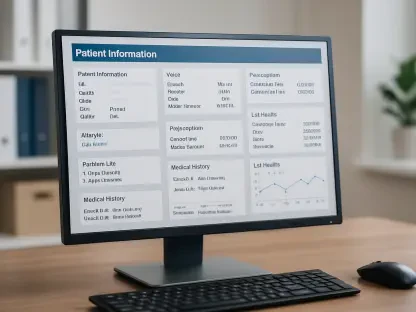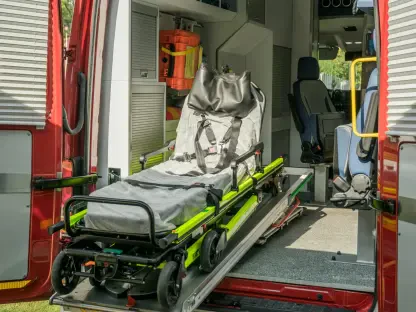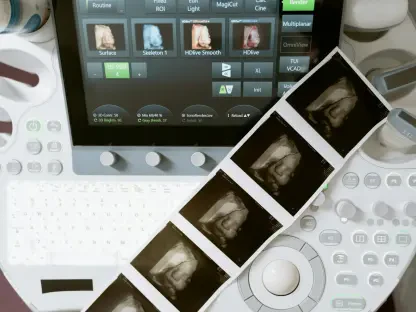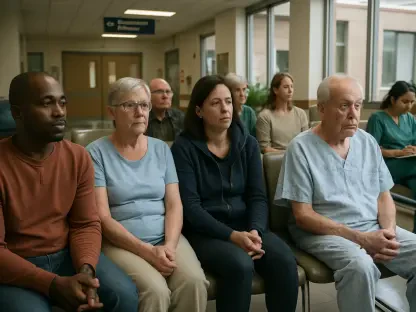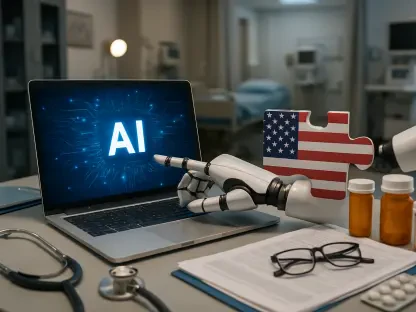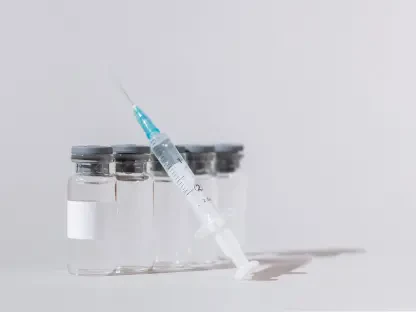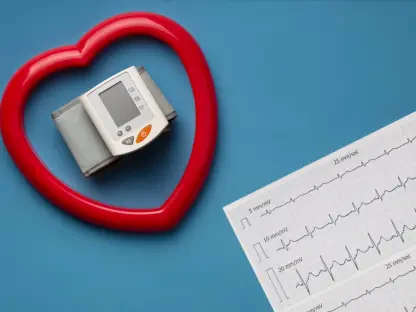In a state where agriculture forms the backbone of the economy, the Texas A&M Veterinary Medical Diagnostic Laboratory (TVMDL) stands as a critical shield against threats to animal health and public safety. As of January 1, a new chapter has begun for this vital institution within the Texas A&M University System with the appointment of Kiril Dimitrov, DVM, Ph.D., as its director, following the retirement of Amy Swinford, DVM. This transition arrives at a time when emerging diseases and zoonotic risks pose unprecedented challenges to Texas’s sprawling livestock industry. Dimitrov, with his extensive background in virology and molecular diagnostics, steps into the role with a proven track record of innovation and crisis response. His leadership signals a commitment to advancing TVMDL’s mission of safeguarding animal health while supporting one of the largest agricultural sectors in the nation. This pivotal change raises questions about how his expertise will shape the future of veterinary diagnostics in Texas and beyond.
Background and Expertise
From Amarillo to Leadership
Kiril Dimitrov’s ascent within TVMDL reflects a career built on dedication and deep technical knowledge. Beginning his tenure in 2019 at the Amarillo location as head of virology and molecular diagnostics, he swiftly demonstrated an ability to navigate complex scientific challenges with precision. His progression to assistant and later associate agency director showcased not only his expertise but also his alignment with the agency’s goals of enhancing diagnostic capabilities. Each role allowed Dimitrov to refine his understanding of TVMDL’s operations, from laboratory workflows to strategic planning. This steady climb through the ranks prepared him to take on the directorship, bringing a comprehensive perspective to the agency’s mission. His journey illustrates a blend of hands-on experience and leadership acumen, positioning him as a natural fit to guide the laboratory through future hurdles in animal health protection across Texas.
Dimitrov’s early career and academic foundation further underscore his readiness for this role. With degrees from Trakia University in Bulgaria and a doctorate from the National Diagnostic and Research Veterinary Medicine Institute in Sofia, his initial focus on food safety and avian disease diagnostics laid a robust groundwork. Time spent as a visiting scientist at the U.S. Department of Agriculture’s National Poultry Research Center in Georgia sharpened his skills in rapid diagnostic methods and viral epidemiology. These experiences, combined with years at TVMDL, have equipped him with a unique blend of global insights and local expertise. His background ensures that decisions made under his leadership are informed by both cutting-edge science and practical application, a critical balance for an agency tasked with protecting Texas’s agricultural interests against evolving threats.
Building a Foundation for Innovation
Beyond his roles within TVMDL, Dimitrov’s contributions to the broader field of veterinary science reveal a forward-thinking approach. His early work in Bulgaria and subsequent international engagements exposed him to diverse diagnostic challenges, from avian diseases to food safety protocols. This global perspective has been instrumental in shaping his strategies at TVMDL, where he has consistently pushed for the adoption of advanced methodologies. His ability to integrate lessons from varied contexts into the agency’s framework demonstrates a rare adaptability. Such a skill set is vital for a state like Texas, where the livestock industry faces both regional and international disease risks. Dimitrov’s foundation positions him to lead with a vision that transcends local boundaries, ensuring TVMDL remains a leader in veterinary diagnostics.
Additionally, Dimitrov’s academic rigor has translated into tangible advancements at TVMDL. His doctoral research and subsequent projects have emphasized the importance of precision in diagnostics, a principle that continues to guide his work. By fostering a culture of scientific inquiry within the agency, he has encouraged staff to pursue innovative solutions to longstanding problems. This focus on continuous improvement has already begun to yield results, as seen in the agency’s enhanced capabilities over recent years. As director, Dimitrov is expected to further this momentum, leveraging his background to drive policies that prioritize research and development. His leadership in this area will likely strengthen TVMDL’s reputation as a hub for groundbreaking work in animal health, benefiting not just Texas but the broader veterinary community.
Crisis Response and Industry Impact
Tackling COVID-19 and Avian Influenza
Dimitrov’s ability to respond to crises has been a defining feature of his tenure at TVMDL, showcasing his capacity to adapt under pressure. In 2020, during the height of the COVID-19 pandemic, he led an unprecedented initiative that bridged veterinary and human health diagnostics. By implementing polymerase chain reaction (PCR) testing at the Amarillo lab and training healthcare staff, Dimitrov enabled TVMDL to support testing for thousands of Texans, marking a historic first for the agency. This partnership with human healthcare providers highlighted his innovative mindset and willingness to step beyond traditional boundaries. The effort not only expanded testing capacity during a critical time but also set a precedent for how veterinary labs can contribute to public health emergencies, demonstrating Dimitrov’s strategic foresight in addressing urgent societal needs.
More recently, in 2024, Dimitrov played a pivotal role in identifying highly pathogenic avian influenza (HPAI) in dairy cattle across the Texas Panhandle. As part of a core team of scientists, he helped unravel the complexities of this evolving disease, which presented unusual symptoms in affected herds. His expertise in virology and molecular diagnostics was instrumental in pinpointing the threat, enabling timely interventions to protect the agricultural sector. This achievement further cemented his reputation as a trusted leader in managing emerging animal health challenges. Collaborations with national committees and other diagnostic labs during this crisis underscored his ability to coordinate efforts on a large scale. Dimitrov’s work in this area illustrates how his leadership can directly impact Texas’s livestock industry, ensuring rapid responses to threats that could otherwise devastate local economies.
Driving Advances in Diagnostics
Dimitrov’s influence extends beyond crisis response into the realm of research and industry support, where his initiatives are shaping the future of veterinary diagnostics. Leading multimillion-dollar projects, including a collaboration with Cornell University, he is spearheading efforts to develop technologies for early disease detection in cattle. This work aims to provide ranchers with tools to identify health issues before they escalate, potentially saving millions in losses. Simultaneously, projects focused on enhancing testing methods for the poultry industry reflect his commitment to protecting key agricultural sectors. Backed by substantial funding, these endeavors highlight Dimitrov’s ability to secure resources for impactful research. His dual focus on innovation and practical application ensures that TVMDL’s advancements directly benefit stakeholders across Texas.
Furthermore, Dimitrov’s emphasis on molecular diagnostics and bioinformatics positions TVMDL at the forefront of tracking viral evolution, a critical need in an era of increasing zoonotic diseases. By integrating advanced sequencing methodologies, his research provides deeper insights into how pathogens adapt and spread, informing more effective containment strategies. This scientific leadership not only strengthens the agency’s diagnostic capabilities but also enhances its role as a knowledge hub for the veterinary community. Partnerships with top institutions amplify the reach of these efforts, fostering a collaborative environment that drives progress. As Dimitrov continues to champion such initiatives, TVMDL is likely to see sustained growth in its ability to address complex health threats, reinforcing its importance to both agriculture and public safety in the state.
Future of Veterinary Diagnostics
Leading in a Time of Emerging Threats
As the new director of TVMDL, Dimitrov steps into a landscape where the stakes for veterinary diagnostics have never been higher. With zoonotic diseases and emerging pathogens posing constant risks, his expertise in molecular tools and rapid response mechanisms offers a strong foundation for tackling these challenges. Advanced sequencing and bioinformatics, areas in which Dimitrov excels, are becoming indispensable for tracking viral mutations and preventing outbreaks. His leadership is expected to prioritize these technologies, ensuring that TVMDL remains agile in the face of evolving threats. This focus will be crucial for protecting Texas’s agricultural economy, which relies heavily on the health of its livestock. Dimitrov’s strategic vision promises to keep the agency at the cutting edge, safeguarding both animal and public well-being across the region.
Equally important is Dimitrov’s ability to build on the legacy of excellence established by predecessors like Amy Swinford. His approach to leadership emphasizes continuity while introducing innovative practices that address modern needs. By fostering collaboration with national and international diagnostic networks, he aims to position TVMDL as a leader in global animal health initiatives. This outward-looking perspective is vital in a time when diseases can cross borders with ease, requiring coordinated responses. Under Dimitrov’s guidance, the agency is likely to strengthen its role as a trusted partner in combating health threats. His tenure will undoubtedly shape how veterinary diagnostics evolve, ensuring that Texas remains prepared for whatever challenges lie ahead in the complex landscape of animal health.
Reflecting on a Legacy of Impact
Looking back, Dimitrov’s journey to directorship was marked by transformative contributions that redefined TVMDL’s capabilities. His pivotal role in the 2020 COVID-19 testing expansion showcased an ability to adapt veterinary expertise to human health crises, setting a new benchmark for interdisciplinary impact. Similarly, his work in identifying HPAI in dairy cattle in 2024 addressed a critical agricultural issue with precision and speed, protecting Texas’s dairy industry from potential collapse. These milestones, alongside his research leadership, left an indelible mark on the agency’s trajectory. As his tenure as director began, it was clear that Dimitrov had already built a foundation of trust and innovation that would guide future efforts.
Moving forward, the focus under Dimitrov’s leadership should center on proactive measures to anticipate and mitigate disease risks before they escalate. Investing in predictive technologies and fostering stronger ties with industry stakeholders could enhance early warning systems for Texas’s livestock sectors. Additionally, expanding training programs for diagnostic staff might ensure that the agency remains equipped to handle future crises with the same effectiveness seen in past responses. Dimitrov’s proven ability to secure funding and drive collaborative projects offers a pathway to realizing these goals. His stewardship holds the promise of not just maintaining TVMDL’s vital role, but elevating it to new heights in safeguarding the state’s agricultural and public health landscape.



